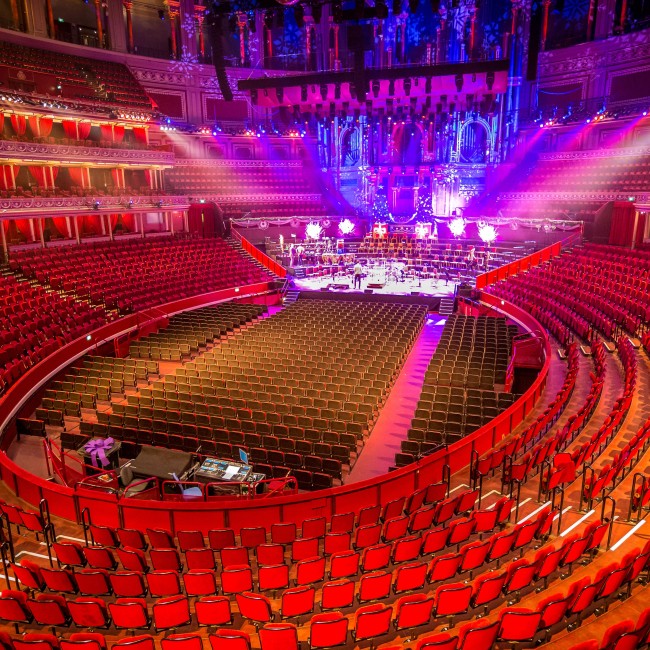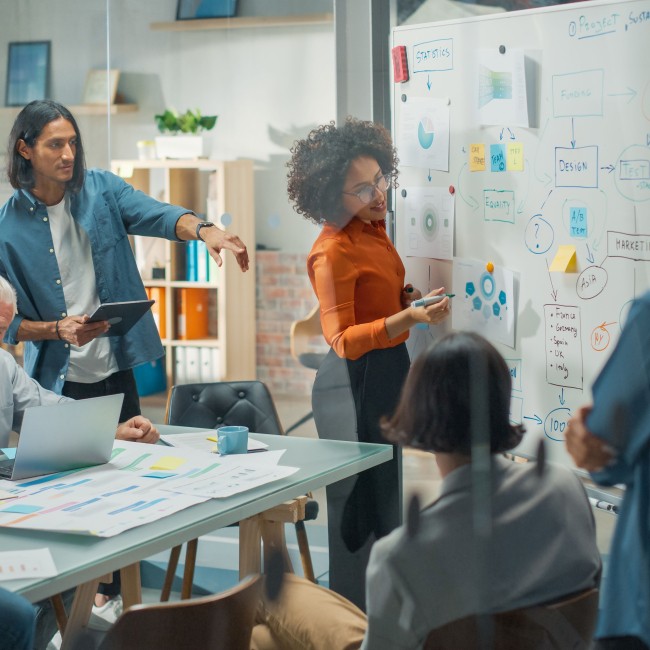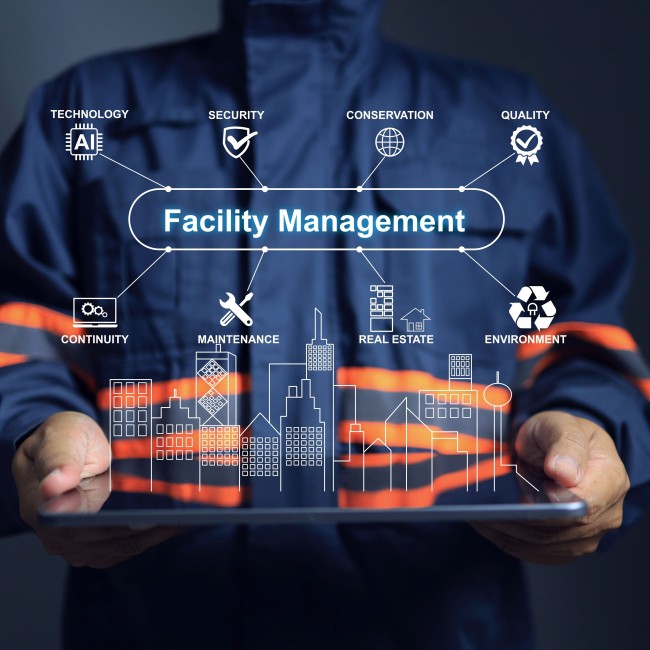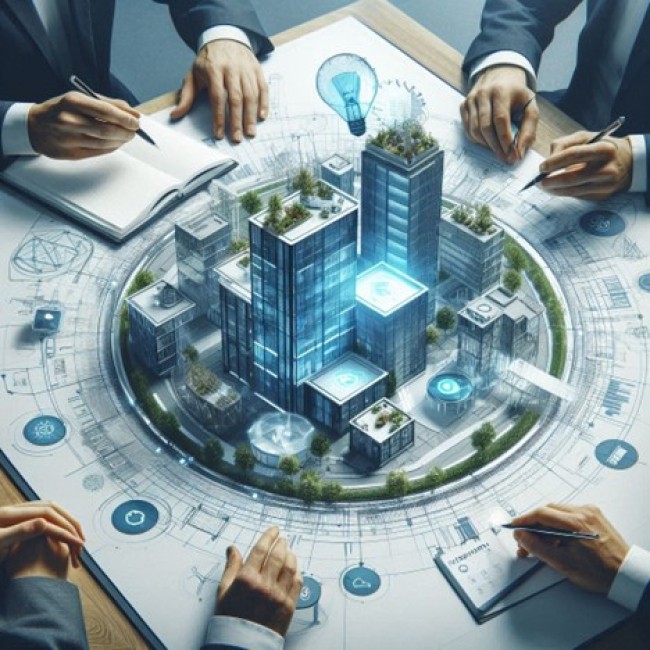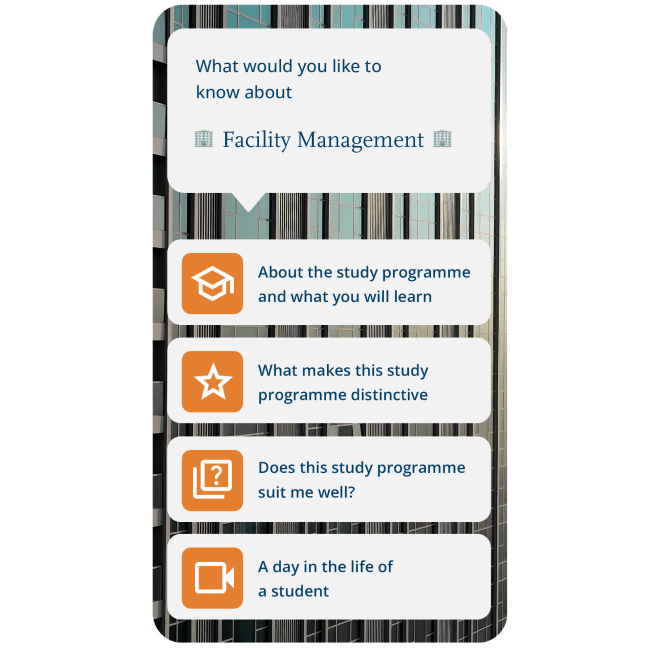Come and meet us
Walking around on campus is the best way to truly experience BUas. Sign up for one of the upcoming events or activities.
Discover the Facility Management programme
Discover the Facility Management programme in an interactive story. Swipe through the shorts, see what you can become later and take the quiz to see if this study suits you!
Study overview
Year 1
The study programme consists of 4 years, divided into 8 semesters. More information on the study programme and its courses can be found in the complete programme overview. Below, we explain what to expect in the first year. The structure of the study programme is currently being updated. In other words, the information below may be subject to change.
In the first year - the propaedeutic phase - you will take two modules (semester 1 and semester 2). Each module includes a number of courses.
In your first week, you will go on a company visit with your class, gaining an immediate behind-the-scenes glimpse of the facility management industry.
Module - Knowing the Fundamentals of Facility Operations
This module focuses on theory and practice. You will learn the fundamentals of Operations Management, Management Information Systems, Workplace Management, while also gaining extensive hands-on experience in our Sibelicious training company on the BUas campus. Here, you will dive straight into the world of Facility Management, applying what you learn by actively participating in real-life operations. Think Service Desk, Food Courts, support in the Restaurant, and many other great opportunities.
Module – Understanding the Facility Management Industry
In this module, you will focus a little more on theory. You will explore subjects like Finance, Economics, Marketing, Business Law & Ethics, and Research & Design - all designed to provide you with the essential foundation and knowledge for the years ahead.
Besides these interesting modules, you will also pursue standard courses such as Facility Management Specific, Management Development Programme, and English.
Years 2, 3 and 4
- Years 2 and 3
After the first year, you will enter the main phase. Here, years 2 and 3 merge into each other. In your third semester, you will be at school with all the students of your year. However, in semesters 4 and 5 you will switch: some students go on placement in semester 4, while others stay in school. In semester 6, everyone returns to school again. In these semesters you will take part in the following modules:
Developing People and Organisations
In this module, you will mainly explore people’s behaviour and what that means for an organisation (or for working in an organisation). The courses you take are Oganisational Behaviour, Business Law & Ethics, Research & Design, and Economics.Managing Business Performance and Innovation
In this module, you will learn all about customer relations, service marketing, and pricing strategies. The courses you take are Accounting, Operations Management, Management Information Systems, and Marketing.Exploring the International Hospitality Industry (placement)
During this five-month placement, you will experience what it is like to live and work in an intercultural facility management environment abroad.In year 3, you will take the Creating Impact module. In this module, you will work with a group of students to design a sustainable strategic business that creates impact. An engaging challenge where you will put into practice the knowledge and skills you have gained in the first two years of study! This course will immerse you in the industry sustainability debate, develop your strategic thinking skills and expand your knowledge of experience design. Understanding the interrelationship between these aspects will form the basis of your design!
- Year 4
In your graduation year (year 4), you will work on your thesis and you can do another study component of your choice, such as an exchange, a minor, a pre-master’s, an additional placement, or writing a consultancy report or business plan. For your thesis as well as the optional part, you will obviously choose a topic (or context) that suits you perfectly! You will be supported in this process by a study coach, who will guide you through to your thesis defence.
- Placement
The placement period falls in the second semester of year 2 or the first semester of year 3.
For 24 weeks you will experience living and working in a real-life, cross-cultural facility environment abroad. You work approximately 40 hours per week. During your placement, you may receive a visit from your supervising lecturer, to make sure that you are doing well, that your placement company is taking good care of you, and of course, to discuss your professional and personal development.
We therefore have a geographical cluster of placement destinations: Australia (Sydney), Austria, Aruba, Bonaire, Saint Martin, Belgium, Germany, Ireland, Finland, Malta, Norway, Sweden, Denmark, UK, United Arab Emirates (Dubai). Please note that these destinations might change due to unforeseen circumstances.
- Exchange
Spending time studying abroad offers you the opportunity to push your boundaries, both literally and figuratively. You expand your international network, learn another language and gain more insight into intercultural differences (and similarities!). Breda University of Applied Sciences has contacts with numerous universities all over the world where you can go as an exchange student.
- Minor
During a minor, you can choose whether you want to delve deeper into your current field of study or broaden your horizons in a different subject. You can choose to take a minor at BUas. Check out all the minors that BUas offers here. You can also choose a minor at another university of applied sciences in the Netherlands or go abroad.
- Pre-master
We offer all students the chance to attend the academic pre-master Strategic Business Management and Marketing (SBM). This pre-master gives you direct access to Master of Science programmes in business-related studies at our university partners, such as the University of Amsterdam, Maastricht, Tilburg, Brussels (B) or Warwick (UK). After this pre-master, you also have direct access to our academic master’s programme of Leisure and Tourism Studies. In this way, you can obtain an academic master’s degree in just five years, or even in four years (if you opt for a three-year bachelor’s track)!
Teaching method
This study programme uses a variety of teaching methods. You will attend lectures, workshops, practical sessions in Sibelicious, and be given many group assignments. You will be tested during examination periods, give final presentations, and also submit portfolios. The Facility Management programme is characterised by small-scale teaching, which means you build a good connection with your lecturers and you also have several one-to-one meetings with your coach.
In this programme, you are trained to become an all-round facility manager. First, you will work on your development. In our learning community, you will not only acquire knowledge, but also develop competencies. We will help you learn what you need to know and be able to do, and we will give you practical, on-the-job training. It is about the right mix of qualities, attitudes and skills you need as a professional. This programme will give you everything you need to get the international job of your dreams!
Study load and coaching
Study load
On average, you will spend 35 hours per week on your studies. You will attend lectures and work on projects, and prepare for examinations and assessments. Classes take place between 9.00 and 17.00 hrs. During practical weeks, you will work full-time in the kitchen, restaurant or at the Visitor Centre on campus. Class hours are then between 8.00 and 22.00 hrs.
- A typical week
Below, you will find an example of a typical week. Keep in mind that this schedule may vary each week, and this example serves as an indication.
Monday:
- 11:00-13:00 Workshop on Management Development Programme
- 13:00-14:00 Lunch at the catering outlet
- 14:00-16:00 Workshop on FM Specific
Tuesday:
- 09:30-11:00 Lecture on Operations Management
- 11.00-13.00 Individual meeting with your coach, followed by lunch
- 13:00-15:00 Workshop on Research and Design
Wednesday:
- 09:00-12:00 Workshop: Designing an Office Environment (Operations Management)
- 12.00-12.30 Coffee with a lecturer to ask questions (together with your project group)
- 12:30-13:00 Quick lunch
- 13:00-15:00 Workshop on Ethics
- 15.00-15.30 Giving a presentation for FM Specific
Thursday:
- 10:00-12.00 Lecture on Finance
- 12.00-13.00 Studying at school together with your classmates
- 14:00-15:00 English class
- 15:00-17:00 Lecture on Business Law
Friday:
- 09:00-11:00 Workshop on Research and Design
- 11:00-12:00 Lunch with classmates
- 12:30-14:30 Guest lecture by an alumnus who works at Enexis as Facility Coordinator
Study coaching
Throughout your studies, you will work on developing your personal and professional skills in the Management Development Programme. You will do this together with your study coach. Topics covered in this programme include time management, communication skills, teamwork, learning styles, leadership styles, report writing and referencing, digital skills and working with specific computer programmes.
In your second year of study, you will start working with Lumina Spark, gaining insight into your strengths and your areas for development.
In the final stages of the programme, the focus shifts to the industry, where decision-making, senior leadership, negotiation, and entrepreneurship are key topics. Part of the Management Development Programme is your Personal Professional Development Plan. You will create this plan yourself, guided by your study coach. Based on this plan, you will review your study progress and development together with your study coach.
Student well-being
BUas encourages and helps you to make the most of yourself, whatever your circumstances. Maybe you have a chronic illness, are a family carer, a competitive athlete, or juggle your studies with running your own business? Our study coaches, student counsellors and student psychologists are here to help. Do you need extra support or advice? Or extra facilities? Then take a look at the options here.
Specialisations
Facility services are everywhere, so it makes sense that this programme allows you to integrate with specialisations from our Tourism and Leisure & Events programmes! You make this choice at the end of year 1. Instead of continuing with the standard Facility Management curriculum, you will then embark on a specialisation from the perspective of Facility Management.
- Attractions & Theme Parks Management (English)
From the second year, you can choose to pursue the two-year Attractions & Theme Parks Management (ATPM) track. This is a specialisation offered to students from the Tourism Management, Facility Management, and Leisure & Events Management programmes.
Why this specialisation?
The number of attraction and theme parks is still growing and the competition is fierce. It’s not just theme parks that are constantly reinventing themselves; holiday resorts, zoos, shopping centres and museums - to name a few examples from your future field of work - also focus more and more on creating memorable experiences. In addition, there is still much to gain in terms of corporate social responsibility. In short, things can and must change to become more experiential and more sustainable.A new generation of managers
There is great demand for a new generation of managers capable of creating successful and meaningful concepts and experiences (concept design) from a business perspective (business design). In this specialisation, you will learn how to innovate products and services to create added value for both visitors and the company you work for.The challenge
There is no such thing as a one-size-fits-all business model in the world of attraction and theme parks. The challenge is to make the right combinations and come up with something that makes you stand out and builds goodwill. An example? Zoos are making a turn towards a more ethical and educational approach, whereas museums are adding a bit more experience and interaction. And theme parks try to immerse people in complete themed worlds. Digitalisation, AI and sustainability are playing an increasing role at all parks, and we also pay a lot of attention to these themes within BUas.What will you do?
You will dive into the world of marketing, finance, workforce planning and safety, because you need that knowledge. But you will also explore the fields of Hospitality, Imagineering and Storytelling. You will work on your creative leadership skills and learn about change management. Each course is linked to a real client from the world of attractions. During your studies, you can do a placement at ‘world parks’ such as Walt Disney World in Orlando, Europa-Park, and Efteling.More information can be found on the website of Attractions & Theme Parks Management.
- Social Innovation
Starting in your second year, you can dive into the three-year Social Innovation track. This is an ideal choice for anyone studying Tourism, Facility or Leisure & Events who is socially conscious and eager to make a meaningful contribution.
Social Innovation is all about coming up with solutions with people, not just for them. You will team up with fellow students in the Performatory on campus to brainstorm creative solutions to societal issues in areas like health, equality, human rights, and the environment.
Examples of project challenges include:
- Finding ways for tourism to benefit local communities
- Organising a dance party for people experiencing homelessness
- Designing future-ready workspaces
You will tackle real-world problems for all kinds of organisations, just think of sports events organisers, theatres, museums, festivals, and also healthcare institutions and governments. You will often work across different sectors, collaborating with new people while expanding both your network and experience.
Social Innovation at BUas boasts a vibrant community with diverse backgrounds and areas of expertise. A unique aspect of this track is that you get to shape your own learning journey.
You will choose your own topics and projects within a clear framework. Each year, you will engage in about eight hands-on projects, utilising design-thinking skills. What’s more, you will work in self-chosen teams, mixing with students from other years and programmes.
Excursions and field trips
To experience your theory in the real world, you will go on three international field trips, during your facilities management programme. Only then you can see, look and feel what it’s like to work in the facilities management business.
The main goal during the field trip in the propaedeutic year is to introduce you to the international facility management industry and to familiarise you with the various aspects it consists of. Special attention is given to facility / service concepts, cross-cultural aspects, and sustainable development within the facility industry. Getting in touch with the industry and reflecting on the observations and interactions with it, are an important part of the activity.
The field trip in main phase I focuses on project management in a cross-cultural context, in which group dynamic skills and leadership skills are (further) developed within an international setting. You will be introduced to or get in contact with the international facility management industry.
Together with your fellow students of Hotel Management, you will take part in the third study trip during main phase II. In this trip you will further experience the way in which several departments work together, with overlapping disciplines such as finance, marketing, revenue and sustainability.
Study tracks after vwo, hbo or wo
You will benefit from the intensive three-year programme in two respects: you gain one year in time, and save one year of tuition fees.
- after vwo (pre-university): you will start in year 2 and also receive basic knowledge and skills from year 1.
- after propaedeutic year (economic programme): you will start in year 2 and also receive basic knowledge and skills from year 1.
The differences between the three- and four-year programme can mainly be found in your first year of study. The three-year programme starts with modules from the second year of the regular programme. To ensure that basic knowledge of the first year is covered, some additional classes are scheduled and relevant study material is made available to you. Furthermore you will receive a short introduction to the facility industry with practical components in our in-school training company Sibelicious.
For both the regular four-year programme and the special three-year programme a minimum of 60 ECTS credits need to be completed during the first year of study. Changing from one track to the other during the course of study will not be possible.
- Year 1
In this first year (your propaedeutic year) you will take two modules.
Developing People and Organisations In this module, you look mainly at people's behaviour and what that means for (working in) an organisation. Courses: Organisational Behaviour, Business Law & Ethics, Investigative Abilities, and Economics.
Managing Business Performance and Innovation
In this module, you will learn all about customer relations, service marketing and pricing strategies. Courses: Accounting, Operations Management, Management Information Systems, and Marketing.You will go on company visits a few times and discover what a facility manager does and what it is like to work in the facility services industry. This year, you will gain practical experience in Sibelicious training company. You will work at the food courts, the Service Desk, the restaurant and in the kitchen. You will organise events, and welcome and assist the guests who come to BUas every day for lunch, dinner, meetings or gatherings.
- Year 2
The second year of your studies is the main phase.
Exploring the International Facility Industry During this five-month placement, you will experience what it is like to live and work in an intercultural facility management environment abroad.
This year, you will attend the module of Creating Excellence in Facility Management, which is about Strategic Management. With the research skills you have developed, you will map out strategic opportunities for companies. In doing so, you will use everything you have learned previously in the field of strategy and policy.
- Year 3
In this year you will graduate; we refer to this as Owning Your Career. You will work on your thesis and you can do another study component of your choice, such as a minor, an additional placement, or writing a consultancy report or business plan. For your thesis as well as the optional part, you will obviously choose a topic (or context) that suits you perfectly! You will be supported in this process by a study coach, who will guide you through to your thesis defence.
Entrepreneurship
At BUas you are trained to become an entrepreneurial professional. In all the professional bachelor’s programmes, you are given the opportunity to develop your entrepreneurial skills. Alongside your studies, you can join BUas Startup Support, BUSS. BUSS organises (networking) events and connects student startup entrepreneurs, there is even the possibility to apply for guidance from your own startup coach.
You can also graduate within BUas with your own company! Every academy offers this opportunity, though a selection process may apply. Maybe, by that time, you already have a small profitable business or have plans to start one? BUas Startup Support can help you.
More information on how to start your own business.
What makes this study programme unique
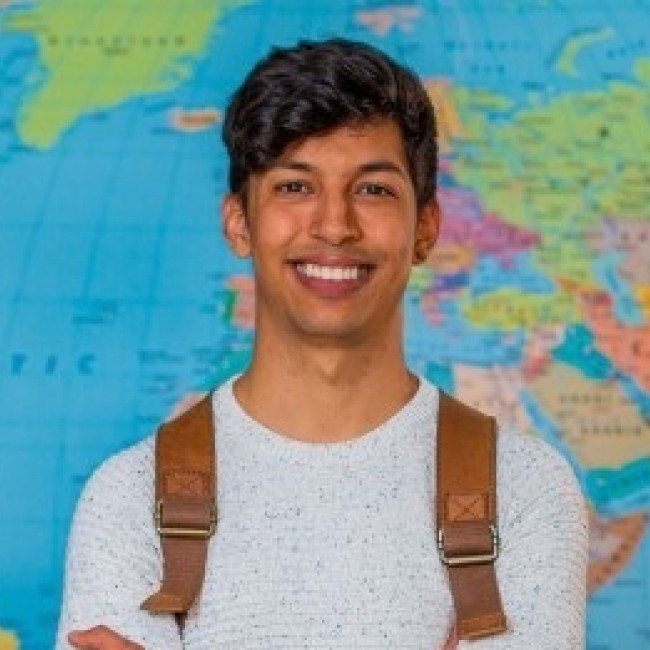
The international journey
Our study programme is the only English-taught programme in the field of facility management in the Netherlands with a strong focus on internationalisation.

Sibelicious
In a beautiful former convent complete with a lovely chapel, you will be trained on the job in Restaurant Sibelicious, our Taste Lab and the Visitor Centre.
Admission & application
What are the admission requirements?
To be admitted to this degree programme, you need a havo or vwo diploma with an appropriate profile, or an equivalent of these Dutch diplomas. You can also be admitted with a level-4 mbo diploma.
- Check out the complete admission requirements and the possibilities if you do not meet the requirements
- Additional requirements have been set for the 3-year track.
Information about admission requirements
What does this study programme cost?
In the academic year 2025-2026 the statutory tuition fee for bachelor's programmes is €2,601. In addition, you should take extra costs for software, excursions, etc. into account.
How can I apply?
If you meet the admission requirements, you can apply for this study programme. If you do so before 1 May, you can certainly start your studies.
What others say about Facility Management

A real BUas mentality

The graduates were exceptional
The graduates I took on board from Breda University were exceptional, having a thorough understanding of the basics of facility management and core skills like project management.

They enjoy what they are learning

What can you do after your studies?
After studying International Facility Management, you will be equipped to enter a variety of facilities management jobs, at home or abroad. Career examples are: innovation manager, work environment advisor or event manager. Possible employers: multinationals, hotels, hospitals, airports, catering businesses.

Virtual campus tour
Have a virtual look and discover the Horizon building where you’ll be studying and what more the campus has to offer.
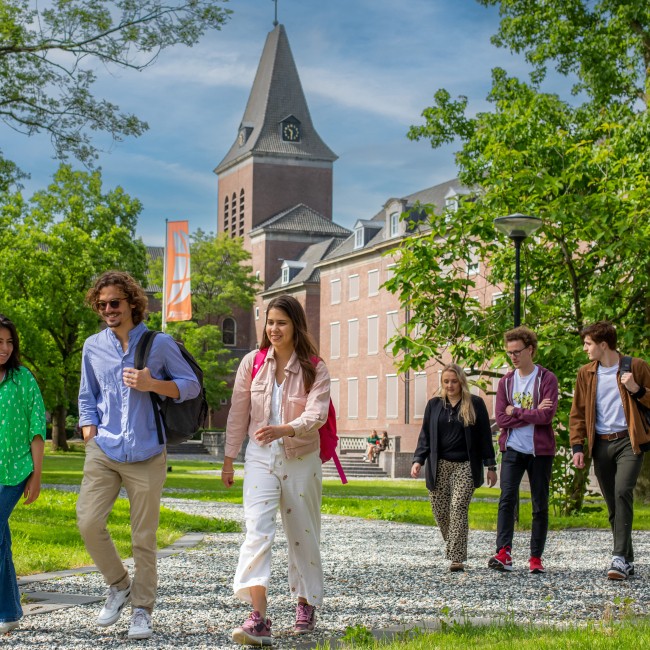
Studying at BUas
What is it like studying at BUas? What does the campus look like and what activities can be undertaken? Is Breda actually a vibrant university town?

Assistance in choosing your study programme
Do you already know exactly what you want to study or do you not have any clue at all? Find out, compare and choose your professional/ academic bachelor’s or master’s programme at BUas.


